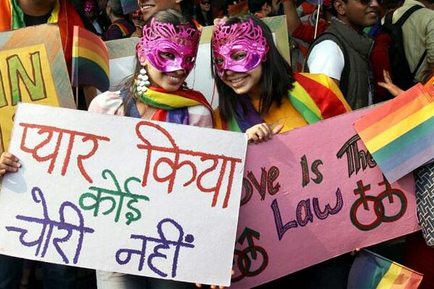Human Rights and Immigration Lawyer Contact Me
India’s Supreme Court Re-Criminalizes Gay Sex
In a shockingly poor decision, the Indian Supreme Court has reversed the July 2009 ruling of the Delhi High Court decriminalising gay sex between consenting adults. In doing so, India’s Supreme Court has recriminalized gay sex in India, rendering almost 20 percent of the global LGBT population illegal.
Overturning a High Court decision, the Indian Supreme Court upheld Indian Penal Code 377, an archaic and barbaric law that criminalizes “homosexual” acts:
377. Unnatural offenses — Whoever voluntarily has carnal intercourse against the order of nature with any man, woman or animal, shall be punished with imprisonment for life, or with imprisonment of either description for a term which may extend to ten years, and shall also be liable to fine.
Western media and LGBT organizations are already demonizing India as “backward” after this ruling, which does not make life easier for Indians who are gay and lesbian abroad, and conveniently casts the West as an arbiter of freedom. In fact, the New York Times took a potshot at Asian countries as a whole in reporting about India’s tragic decision, perhaps forgetting that gay sex was illegal in parts of the United States only ten years ago. Because LGBT people have been marginalized and mistreated for so long, many people in the West mistakenly see some forms of “gay rights” as a marker for progress or modernity. Anthropologist Akshaye Khanna articulates this quite well:
We are seeing, in several parts of the world, a cynical appropriation of the discourse of sexual rights and sexuality by right wing and reactionary agendas. In Western Europe, North America and Israel, we see the phenomenon of ‘homonationalism’, where LGBT discourse is being used in deeply racist—usually Islamophobic—groups. In East Africa, the question of sexuality has come to be the central question in discourse about the nation – where notions of ‘Africanness’ have come to be tied to the position on homosexuality. This centering of the question of sexuality is always a way of diverting attention from political and economic questions relating to the control over natural resources, or instances of corruption.
While people in India and across the world are mourning and expressing outrage at the ruling, and shaming the entire country, it is important to note that Indian Penal Code 377 is a relic of British rule and colonialism. Contrary to the sexual puritanism and homophobia that the British wrote into the law while colonizing India, Indian and Hindu culture is enriched with queer sensibility. It is rather ironic that the British are finally getting ready to start allowing same-sex marriages next year, while their retrograde policies in former colonies continue to harm and hamper peoples lives. The Indian Supreme Court ruling is a reminder that the Indian people cannot rely on courts to strike down an injustice rooted in colonial oppression, and that colonial ideas remain ingrained in a so-called post-colonial country.
However, colonial-era law or not, many Indians are rightly outraged by this decision from the Indian Supreme Court, which should have outlawed colonial-era discrimination, instead of punting the question of sodomy to the Indian parliament. Thus far, the Indian parliament has remained non-commital on the issue, sparking more outrage on social media and across the country. In a display of vibrant democracy, Indians are taking to the streets both in India and abroad in protest of the ruling. That hardly seems backward and regressive to me.
Funnily, while LGBT organizations in the U.S. expressed disappointement at the decision, they have rarely ever expressed the same sort of outrage about queer immigrants who are criminalized and locked up in detention at home. Claudette Hubbard, a long-time lawful permanent resident of the U.S. who escaped Jamaica after facing persecution for being gay, has been locked in an ICE detention facility for two years now. Viesca, a transgender detainee at El Paso, Texas who won her credible fear interview, reported constant degradation and harassment from guards, and finally agreed to her own deportation yesterday. Kumar Jagdish, a gay asylum seeker from India, has been detained at El Paso, Texas since June, 2013. You won’t hear these stories in the mainstream media, because they do not show a flattering image of the United States as a beacon of hope or democracy. After all, detaining and deporting thousands of immigrants daily is not a marker of modernity any more than criminalizing homosexuality. Frankly, I am disappointed in all of us.
As for Section 377, the law is clearly an abomination. While Section 377 has rarely been used to criminalize gay persons in India, Indian queer liberation activist Kaveri Indira reports that there are many enforced laws on the books that cause less nationl and international outrage, such as Karnataka Police Acts, which criminalizes hijras, gender transgressives and transgender persons. Perhaps it is time to take the outrage, and pour it into the threats and daily assaults against queer and transgender persons of color that are far more real and tangible in both the U.S. and India, than this poor Supreme Court decision.
